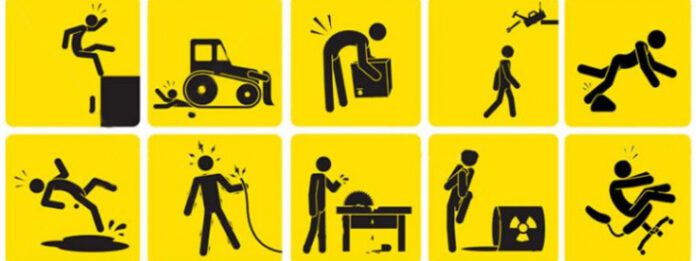In 2019-2020, 693,000 workers sustained a non-fatal injury at work, leading to 6.3 million working days lost. The annual cost of these accidents amounts to an eye-watering £5.6 billion in lost income.
Business insurance experts, Bionic, have put together some useful tips on how to prevent and deal with workplace accidents. The piece includes interesting information:
· Slips, trips and falls are the most common accidents in the workplace (30%).
· Employees have the right to leave a work environment that they deem is too dangerous.
· A RIDDOR Report is a legal requirement that must be used to record any cases of work-related injuries, illnesses or incidents.
· Compensation for work-related injuries varies from person to person.
· 168,000 injuries that happened in workplace involved over 7 days absence.
How to handle a workplace accident
According to HSE, over 693,000 workers have sustained a non-fatal injury at work in 2019/2020. This being said, a survey by National Accident Helpline found that 48% of people in their survey suffered from an injury whilst working from home.
Whether it’s in the office or working from home, it’s essential as an employer that you take all the necessary steps to ensure you’re providing a safe working environment and safe conditions for all your staff.
But, with so much to wrap your head around, knowing how to handle a workplace accident, and your key responsibilities as an employer can be complicated.
If you’re not entirely sure how to handle a workplace accident — or just need some further advice, then business insurance experts, Bionic have provided some useful tips on how to prevent and deal with workplace accidents.
Preventing accidents at work
As an employer, you have a legal duty of care to protect the health and safety of your employees.
Whilst some accidents are unforeseen and can’t be prevented, most can be avoided. Typically, accidents at work happen when adequate risk assessments aren’t taken seriously, members of staff aren’t properly trained or suitably equipped, or when corners are cut to save time and money.
The safety and wellbeing of your staff are your top priority, so it’s important to put preventative measures in place:
- Providing Personal Protective Equipment (PPE) — Including hi-vis clothing, hard hats, protective goggles/glasses, shoe covers, gloves, face shields, hygiene masks etc.
- Health and safety training — Providing adequate health and safety training that is routinely adhered to, will help to reduce the risk of workplace accidents.
- Machinery and equipment training — If any of your employees operate heavy machinery and equipment — like forklift trucks — it’s important that their training, and any qualifications, are kept up to date.
- Regular risk assessments — Undertaking regular risk assessments will ensure that you and your employees can quickly identify any currently existing or potential hazards.
- Maintenance — Making sure that all machinery and equipment has regular maintenance services.
- Appropriate signage — It’s important to display any appropriate signage or hazard warnings e.g ‘wet floor’ or ‘cleaning in progress’ signs for any clean up of spillages.
What to do if an employee has an accident at work
If an employee does have an accident at work, you must report it as soon as possible. This applies whether it’s a simple injury, or something more complex.
Make sure your employee is free from any immediate danger and seek medical attention. If the employee has sustained superficial wounds like a small cut or a graze, they can usually be treated easily on-site by a trained first-aider.
If they require more serious and urgent medical attention for a sustained injury, such as a concussion or broken bone, have a first-aider there to respond and call 999 immediately for medical attention.
Employees have the right to:
- Seek medical attention for any injuries suffered in the workplace.
- Seek compensation for injuries that were sustained in the workplace that is through no fault of their own. They also have the right to file a personal injury claim citing ‘contributory negligence’, which means a person has failed to act reasonably, against the employer.
- Leave a work environment that they deem is too dangerous and puts health, safety and well-being at risk.
Legally, you cannot object or prevent an employee from doing any of the above.
Most common accidents working from home
According to the National Accident Helpline there are a lot of different accidents or ailments we can suffer from as a result of working from our humble abodes. These include:
- 1 in 4 (27%) have complained of suffering from back pain
- 18% reported eye strain
- 10% from a repetitive strain injury. This is usually from using a mouse and laptop.
- 67% who have no choice but to work from a bathroom reported an injury
Most common accidents in the workplace
Using HSE data, we have looked into what the most reported accidents were in the workplace between 2019 and 2020 with 168,000 injuries that involved over 7 days absence.
Some of the injuries reported included:
- 29% from slips, trips and falls
- 19% from handling,lifting or carrying
- 11% struck by a moving object
- 9% acts of violence
- 8% falls from a height
Recording an accident
Every workplace should have at least one trained and qualified first-aider. Make sure that you have a system in place for recording and reporting accidents that happen at work; this is known as an ‘Accident Book’.
When reporting an incident, it’s important to take down:
- Date and time — The date and time the incident occurred.
- Employee details — The name and job title of the employee or employees.
- Injuries sustained — Any injuries that have been sustained in the incident. Whether it be a cut on the arm or a broken bone, everything needs to be recorded in detail e.g size of the cut.
- How the accident happened — It’s important to go into as much detail as possible, including what first aid was given and what happened to the casualty after e.g taken to hospital.
- Official documentation — The name and signature of the person in charge of recording the incident e.g first aider, as well as the employee(s) who have been injured.
When recording an accident, it’s crucial that all information is taken down correctly, whether it’s about serious incidents or cases of disease. This also allows the Health and Safety Executive (HSE) to identify where and how risks arise, and whether they need to be investigated to a wider extent. They can then provide important information on how to avoid work-related injuries, deaths, ill-health and accidental loss.
What is a RIDDOR report?
A RIDDOR report — also known as The Reporting of Injuries, Diseases and Dangerous Occurrence Regulations — is a health and safety legislation that must be used to record any cases of work-related injuries, illnesses or incidents.
Under the RIDDOR you must report:
- Incapacitation from work — If an injured employee is unable to attend work or perform their normal duties for more than seven consecutive days as a result of their injury, this must be reported.
- Specific injuries — These include but are not limited to:
- Amputations.
- Fractures, other than to fingers, toes and thumbs.
- Any injury that may lead to permanent loss or a reduction in sight.
- Serious burns that cover more than 10% of the body or cause significant damage to the respiratory system, eyes or vital organs.
- Any crush injury to the head or torso that is likely to cause damage to the brain or internal organs.
- Loss of consciousness caused by a head injury or asphyxiation.
- Hypothermia or heat-induced illnesses.
- Scalping that requires hospital treatment.
- Any injury that requires resuscitation or admittance to the hospital for more than 24 hours.
- Occupational illnesses — Any diseases or conditions that develop or are proven to be made worse as a direct consequence of your employee’s job must be reported. These include
- Diseases that develop due to prolonged exposure to a biological agent such as asbestosis. This is a serious lung condition that is caused by long-term exposure to asbestos.
- Occupation cancer.
- Hand Arm Vibration Syndrome.
- Occupational asthma or dermatitis.
- Carpal Tunnel.
- Tendonitis or tenosynovitis.
- Dangerous occurrences — Also classed as ‘near misses’, this is where an incident that has taken place had the potential to cause serious injury or death. These are usually associated with hazardous workplace conditions or machinery malfunctions.
- Death — If an employee dies as a result of their injuries.
Who should report accidents that fall under the RIDDOR?
Only people who are deemed ‘responsible persons’ should report any accidents under the RIDDOR. These include:
- Employers or a person in control of the premises — If you’re an employer or in control of the premises e.g renting out office units, you must report any work-related deaths, injuries or cases of disease.
- Self-employed — If you’re self-employed, but you’re working on someone else’s premises, then the person in control of the premises will be responsible for any reporting.
- Members of the public, employees, injured persons and their representatives — Reports should only be submitted by ‘Responsible Persons’ with duties under the RIDDOR regulations.
- Gas suppliers and engineers — If you are a conveyor, filler, importer or supplier of flammable gas and you directly or indirectly learn that someone has died or been injured in connection with gas distribution, this must be reported. Similarly, if you are a registered gas engineer on the Gas Safe Register, any incidents including appliances, flues or ventilation used with any appliances, that you consider to be dangerous, should be reported.
- Working offshore — For a large majority of incidents at an offshore installation, the duty holder will be the responsible person under the Offshore Installation and Pipeline Works Regulations 1995.
- Special cases — In relation to mines, closed tips, quarries, pimples and wells, the person responsible for reporting the incident is either the manager, owner or operator.
How to submit a RIDDOR report
If a member of your staff comes to you with a report of an incident, under the RIDDOR the report must be submitted to the HSE website. This must be submitted within 10 days of the incident happening, or within 15 days if the person who has been injured needs to take more than 7 consecutive days of sick leave.
Fatal or specified incidents can also be reported by telephone. If you fail to report an incident to the RIDDOR, you could face paying a fine of up to £20,000.
What compensation are employees entitled to?
Employees have the right to seek compensation for any injuries that are sustained in the workplace. Providing the incident was caused either through employer negligence, nonsufficient training or a mistake by a colleague. The incident should also have occurred within the last three years.
By law, you are required to pay a portion of your employee’s salary while they are recovering from a work-related injury or illness, this is known as Statutory Sick Pay. In the UK, all companies must have adequate worker’s compensation insurance that can cover medical expenses when an employee is injured at work.
How much compensation should I pay?
Compensation for work-related injuries varies from person to person. Contributing factors to this can include:
- The severity of the injuries that have been sustained.
- Projected and actual expenses for any medical treatment.
- Loss of income for the days the employee had to be off.
- Any cost of mobility aids or home care.
- PTSD, trauma as well as pain and suffering
- Loss of amenity
What to do if an employee makes a claim against you
If an employee does make a claim against you, it’s important to handle the situation in an appropriate manner.
More often than not, many cases of compensation are settled outside of court because of the hefty legal fees you may incur. If you don’t believe that you are liable, you may end up at an employment tribunal or court to argue your case. Usually, solicitors will negotiate on the employee’s behalf to get a settlement that is representative of their injuries.
Employees are also not obliged to discuss any claims with you or give you any notice of making the claim.
How to handle a workplace accident
While understanding how to handle a workplace accident can at times seem overwhelming, it’s important that you put all the relevant measures in place to prevent accidents from happening. If they should happen, you should be aware of your next steps including how to report the accident to the RIDDOR and how to handle a case should an employee try to gain compensation.
David Woodfield, Insurance Director at Bionic, the business comparison experts, said:
“As an employer, you have a duty of care to protect the health, safety and welfare of your employees and anyone else who might be affected by their business. This means it should always be a priority to make sure your workplace is safe, and you give employees the right equipment and training to do their job properly and safely.
“But if a business owner spends all their time and effort on eliminating all the risks they face, no matter how small then they probably wouldn’t have time or resource to make any money. And no matter how much emphasis you place on workplace health and safety, accidents can still happen. That’s why it’s just as important to have the right level of business insurance in place – that way, if the worst does ever happen, you should be covered against the costs of any damages or compensation claims.
“If you employ even one member of staff, employers’ liability insurance is a legal requirement. If your work brings you into contact with anyone that’s not an employee, then you should consider public liability insurance. To get insurance tailored to the exact needs of your business, speak to the tech-enabled team at Bionic.”
Help keep news FREE for our readers
Supporting your local community newspaper/online news outlet is crucial now more than ever. If you believe in independent journalism, then consider making a valuable contribution by making a one-time or monthly donation. We operate in rural areas where providing unbiased news can be challenging. Read More About Supporting The West Wales Chronicle

























